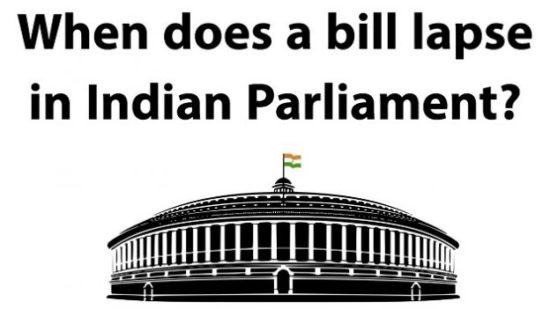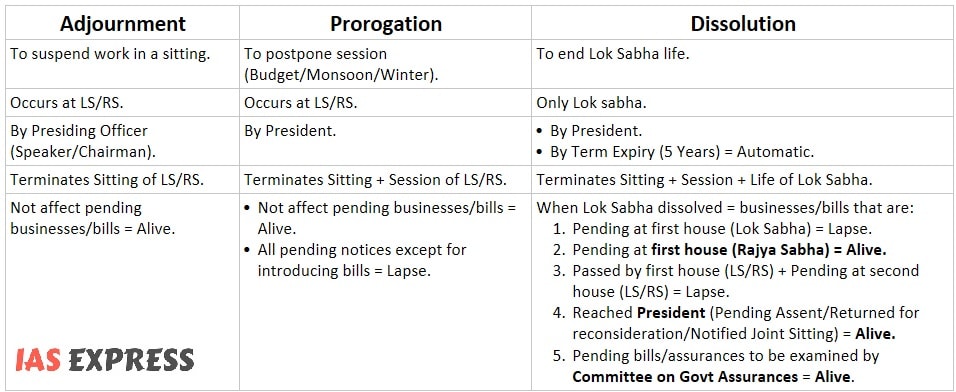5 Simple Rules to Remember the Lapsing Bills in Indian Parliament

In this post, I will be sharing with you 5 simple rules to remember the lapsed/alive businesses or bills after the dissolution of Lok Sabha. This topic is one of the favourites of UPSC as you might easily get confused in the exams.
This topic of “5 Simple Rules to Remember the Lapsing Bills in Indian Parliament” is important from the perspective of the UPSC IAS Examination, which falls under General Studies Portion.
First I will share the detailed info below, then explain that 5 rules:
[You can skip it and jump straight to the rules if you’ve studied this topic before]
Remember that only the Lok Sabha and the Legislative Assemblies are subject to dissolution (and there is no dissolution for Rajya Sabha and State Legislative Council).
When the Lok Sabha is dissolved, all business including bills, motions, resolutions, notices, petitions, etc. pending before it or its committees lapse. They should be reintroduced in the newly-constituted Lok Sabha to be pursued further. Articles 107 and 108 of the Indian Constitution deals with these provisions. The position with regards to the lapsing of bills is as follows:
Cases when a bill lapse:
- A bill originated in the Lok Sabha but pending in the Lok Sabha – lapses.
- A bill originated and passed by the Rajya Sabha but pending in Lok Sabha – lapses.
- A bill originated and passed by the Lok Sabha but pending in the Rajya Sabha – lapses.
- A bill originated in the Rajya Sabha and returned to that House by the Lok Sabha with amendments and still pending in the Rajya Sabha on the date of the dissolution of Lok Sabha- lapses.
Cases when a bill does not lapse:
- A bill pending in the Rajya Sabha but not passed by the Lok Sabha does not lapse.
- If the president has notified the holding of a joint sitting before the dissolution of Lok Sabha, does not lapse.
- A bill passed by both Houses but pending assent of the president does not lapse.
- A bill passed by both Houses but returned by the president for reconsideration of Rajya Sabha does
not lapse. - Some pending bills and all pending assurances that are to be examined by the Committee on Government Assurances do not lapse on the dissolution of the Lok Sabha.
5 Simple Rules to Remember the above:
- Pending at first house (Lok Sabha) = Lapse.
- Pending at first house (Rajya Sabha) = Alive.
- Passed by the first house (LS/RS) + Pending at second house (LS/RS) = Lapse.
- Reached President (Pending Assent/Returned for reconsideration/Notified Joint Sitting) = Alive.
- Pending bills/assurances to be examined by Committee on Govt Assurances = Alive.
You can further refine it to 3 rules by remembering only the Alive instances. All the others are Lapses.
If it is State Legislature, then replace President with Governor, Lok Sabha with State Legislative Assembly and Rajya Sabha with State Legislative Council.
Hope it helps clear your confusion.
Difference between Adjournment, Prorogation, and Dissolution
Yes. You will more likely mess it up if you don’t compare them properly. So read the following table.

